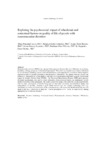Exploring the psychosocial impact of wheelchair and contextual factors on quality of life of people with neuromuscular disorders

Ver/Abrir
Use este enlace para citar
http://hdl.handle.net/2183/18327Colecciones
- Investigación (FIC) [1678]
Metadatos
Mostrar el registro completo del ítemTítulo
Exploring the psychosocial impact of wheelchair and contextual factors on quality of life of people with neuromuscular disordersAutor(es)
Fecha
2015-07-17Cita bibliográfica
Pousada García T, Groba González B, Nieto Rivero L, Pereira Loureiro J, Díez Villoria E, Pazos Sierra A. Exploring the psychosocial impact of wheelchair and contextual factors on quality of life of people with neuromuscular disorders. Assistiv Technol. 2015;27(4):246-56
Resumen
[Abstract] Neuromuscular disorders (NMDs) are a group of heterogeneous diseases that show differences in incidence, hereditary, etiology, prognosis, or functional impairments. Wheelchair use (manual or powered) is influenced by several factors, including personal and contextual factors, and comprehensive evaluation of their impact is required in order to optimize prescription and provision of wheelchairs. The authors therefore assessed the influence of wheelchair use on the quality of life (QoL) of 60 participants with NMD using the Psychosocial Impact of Assistive Devices Scale (PIADS). The Functional Independence Measure (FIM) and a specially developed questionnaire were used to obtain information about contextual factors and participants’ activity profile of activities of the participants. The results showed that using a wheelchair has psychosocial benefits, with the main determinants of benefit being type of wheelchair (powered), non-ambulation ability, and independence in mobility. Ensuring a good match between user and assistive technology (AT; e.g., wheelchair), as well as the effectiveness of the particular device, will increase the likelihood that the user will adopt it and use it effectively in daily life. Clinical prescription of AT would be improved by making appropriate use of outcome measures.
Palabras clave
Assistive technology
Contextual factors
Neuromuscular disorders
Outcomes
Wheelchair
Quality of life
Contextual factors
Neuromuscular disorders
Outcomes
Wheelchair
Quality of life
Versión del editor
Derechos
This is an accepted manuscript of an article published by Taylor & Francis in "Assistive Technology", avaliable online at www.tandfonline.com
ISSN
1040-0435
1949-3614
1949-3614





